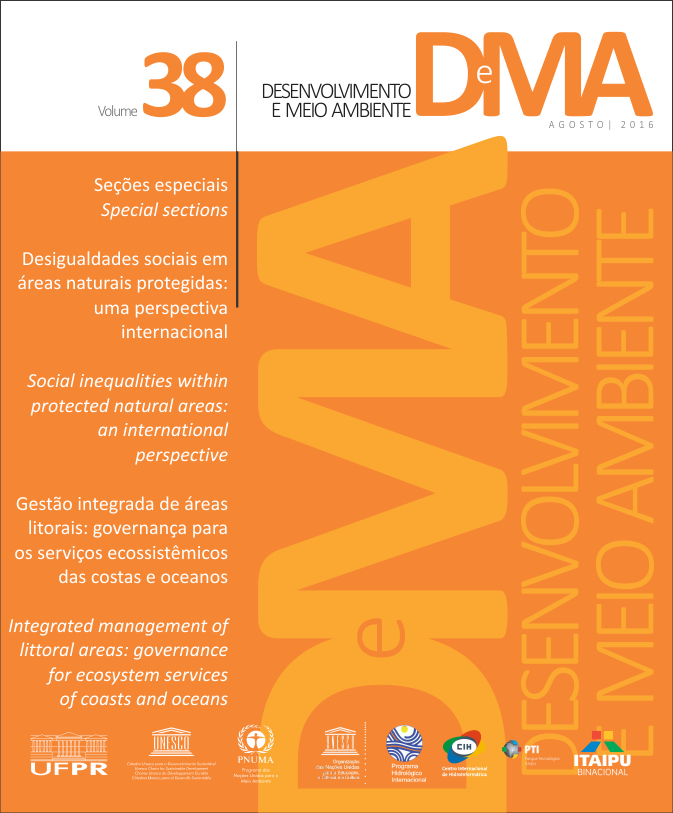Vulnerabilidade de pescadores no litoral sul do Brasil e sua relação com áreas marinhas protegidas em um cenário de declínio da pesca
DOI:
https://doi.org/10.5380/dma.v38i0.45850Palavras-chave:
capacidade adaptativa, unidades de conservação, manguezais, modos de vida, gestão pesqueiraResumo
A vulnerabilidade socioambiental dos pescadores artesanais do litoral norte do Paraná vem aumentando devido à queda na disponibilidade de pescado e a problemas de acesso e gestão dos recursos naturais associados às atuais políticas de conservação. As mudanças climáticas previstas poderão ser fontes adicionais de impacto sobre os modos de vida das comunidades locais. Este trabalho teve como objetivo caracterizar a vulnerabilidade dos pescadores artesanais e suas estratégias de adaptação ao declínio da pesca, consideradas análogas a possíveis respostas aos efeitos futuros das mudanças climáticas, e avaliar o efeito das unidades de conservação sobre estes fatores. Foram feitas entrevistas em 213 domicílios, distribuídos em nove vilas do município de Guaraqueçaba, no Complexo Estuarino de Paranaguá. Os resultados indicam que há elevada variabilidade, em diferentes níveis da escala espacial, nos fatores que geram vulnerabilidade, determinada principalmente pelo nível de dependência em relação à pesca e pelo capital físico e social disponível. As áreas protegidas, caso não sejam adequadamente manejadas, podem afetar a vulnerabilidade dos pescadores duplamente, restringindo tanto o modo de vida atual quanto as opções de adaptação futura daqueles que já são mais vulneráveis. Os resultados dessa análise contribuirão para a adequação e a integração das políticas de gestão da pesca e de conservação da biodiversidade na zona costeira, como forma de promover a redução de desigualdades sociais e o aumento da resiliência conjunta de pescadores e dos ecossistemas costeiros, em um cenário de declínio da pesca e de mudanças climáticas.
Downloads
Publicado
Como Citar
Edição
Seção
Licença
Os Direitos Autorais sobre trabalhos publicados nesta revista são do autor, com direitos de primeira publicação para a revista. O conteúdo dos trabalhos publicados é de inteira responsabilidade dos autores. A DMA é um periódico de acesso aberto (open access), e adota a licença Creative Commons Atribuição 4.0 Não Adaptada (CC-BY), desde janeiro de 2023. Portanto, ao serem publicados por esta Revista, os artigos são de livre uso para compartilhar (copiar e redistribuir o material em qualquer suporte ou formato para qualquer fim, mesmo que comercial) e adaptar (remixar, transformar, e criar a partir do material para qualquer fim, mesmo que comercial). É preciso dar o crédito apropriado, prover um link para a licença e indicar se mudanças foram feitas.
Os conteúdos publicados pela DMA do v. 53 de 2020 ao v. 60 de 2022 são protegidos pela licença Creative Commons Atribuição – Não Comercial – Sem Derivações 4.0 Internacional.
A DMA é uma revista de acesso aberto desde a sua criação, entretanto, do v.1 de 2000 ao v. 52 de 2019, o periódico não adotava uma licença Creative Commons e, portanto, o tipo de licença não é indicado na página inicial dos artigos.




